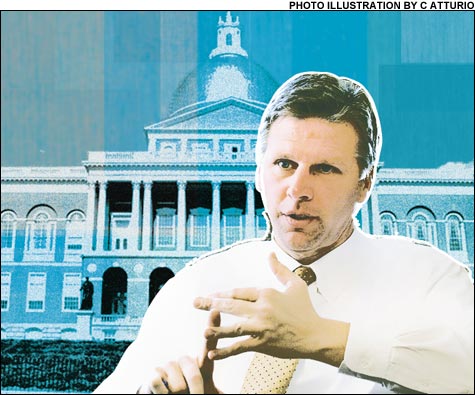
FREEFALL WINDFALL: Will Tim Cahill benefit politically from the economic crisis? |
The current US financial disaster will roil Massachusetts residents in myriad ways. But while most of us worry about our jobs, our mortgages, and our heating oil, rest assured that some in the state are thinking hard about how all of this will affect their political careers.
Massachusetts State Treasurer Tim Cahill, for example, has been keeping a significantly high profile in recent weeks, doing on-air interviews with NECN and giving quotes to almost every publication in the area. That’s no shocker — in a massive financial crisis, the guy handling the state’s billions figures to have something useful to say.
But it’s hard not to see Cahill’s ubiquity as at least partly political. Cahill, a Democrat, is much rumored to be mulling a run for governor — against Deval Patrick in 2010, or sooner if Patrick heads to Washington as part of a Barack Obama administration. “Tim Cahill hasn’t been too shy about what his ambitions are,” says one close State House observer.
Of anyone in the state, Cahill arguably has the most to gain — or lose — politically from the subprime-mortgage catastrophe that has devastated both Wall Street and the US economy. He could be seen as the one who guided the state through rocky shoals, or as the guy in charge of the patient when it started to flat line.
The last treasurer who ran for governor — Shannon O’Brien in 2002 — was pilloried for the poor performance of the state pension fund after 9/11. “[Mitt] Romney basically blamed me for the stock-market crash,” says O’Brien. “You can be doing the best job in the world, and they’re only going to see the latest numbers.”
A cynic, then, might suggest that Cahill is trying to proactively ensure that he comes through this as a hero, rather than a goat. He made sure it was widely reported, for example, that he had to go through hoops to secure funds for the state’s local-aid payments at the end of September. He told that story both to illustrate the need for congressional action and to cast himself as the man whose expert action saved towns from ruin.
Cahill also has been criticizing the Patrick administration, and the state legislature, all year. He blasted the budget they passed this summer as unaffordable — which now looks prophetic, as Patrick seeks to strip hundreds of millions from it through “9C” emergency cuts. He further criticized the numerous bond bills enacted this year as potentially overloading the state’s debt.
Those critiques haven’t made him many friends. (He was blocked from obtaining a delegate slot to the Democratic National Convention this summer.) But they could put him in a position to run in a gubernatorial race as the fiscally conservative candidate, better suited to trim budgets in tight times than the liberals currently in office.
Even so, some say that, by necessity, Patrick is about to become the face of state budget-cutting — which squeezes Cahill out on his signature issue. “[Cahill] could not possibly be more fiscally conservative than the current administration is going to be,” says Scott Ferson, political consultant with Liberty Square Group. “The first casualty of the financial crisis in Massachusetts is Tim Cahill.”